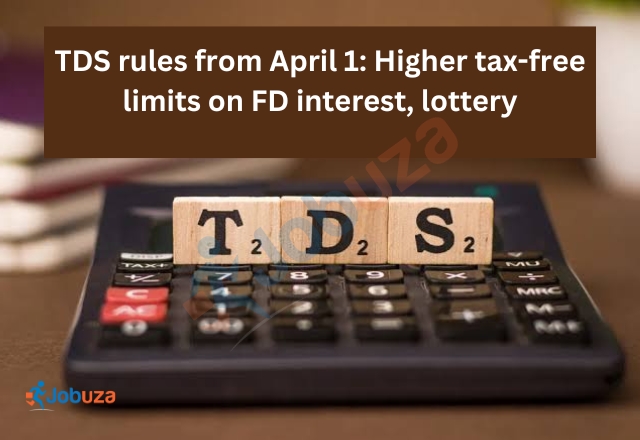Union Budget 2025: Key TDS Rule Changes Effective from April 1
The Union Budget 2025 has introduced significant changes to Tax Deducted at Source (TDS) rules, set to take effect from April 1, 2025. These updates aim to provide financial relief to senior citizens, depositors, investors, and commission earners.
Here’s a breakdown of the major changes:
1. Higher TDS Threshold for Senior Citizens
To benefit senior citizens, the government has doubled the TDS threshold on interest income. Starting April 1, 2025, banks will deduct TDS only if a senior citizen’s total interest income exceeds ₹1 lakh per financial year.
This means if their interest earnings from fixed deposits (FDs), recurring deposits (RDs), or other savings instruments stay within ₹1 lakh, no TDS will be deducted.
2. Higher TDS Limit for General Citizens
For other depositors, the TDS threshold on interest income has been raised from ₹40,000 to ₹50,000. If total interest earnings remain within ₹50,000, no TDS will be deducted. This change will benefit individuals who rely on FD interest as a source of income.
3. Revised TDS Rules on Lottery Winnings
Previously, TDS was deducted if total lottery winnings in a year exceeded ₹10,000, even if received in smaller amounts. Now, TDS will be deducted only if a single transaction exceeds ₹10,000.
4. Higher TDS Limit for Insurance Commission Earners
Insurance agents and brokers will see some relief, as the TDS threshold for insurance commissions has been increased from ₹15,000 to ₹20,000. This change will help them retain more of their earnings.
5. Increased TDS Exemption for Mutual Funds and Stocks
Investors in mutual funds and stocks will now benefit from a higher TDS exemption on dividend income. The threshold has been raised from ₹5,000 to ₹10,000, allowing investors to keep more of their earnings.
Final Thoughts
These updates aim to reduce the tax burden on depositors, investors, and commission earners while simplifying the tax deduction process. With these new thresholds, individuals can enjoy higher tax-free earnings on their savings and investments.
Keep these changes in mind as you plan your finances for the next financial year.



